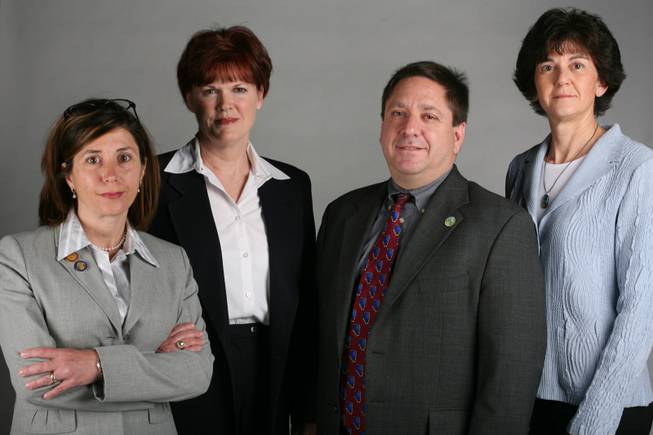
Gathered Thursday for a round-table discussion on the scandal in which thousands were notified they might have been exposed to hepatitis and HIV, are, from left, patient advocate Angie Silla, Assemblywoman Susan Gerhardt, Nevada State Medical Association Secretary Dr. Ron Kline and former Bureau of Licensure and Certification chief Lisa Jones.
Sunday, March 16, 2008 | 2 a.m.
Hepatitis Scare Roundtable
The Sun invited four experts to sit around a table and hold a conversation about the hepatitis scare. We asked a few questions and let them talk among themselves. They were Susan Gerhardt, a Democrat and vice chair of the of the Assembly Health and Human Services Committee, Lisa Jones, chief of the state Bureau of Licensure and Certification, Angie Silla, a registered nurse who is also a patient advocate and Dr. Ronald Kline, secretary of the Nevada State Medical Association, and a board-certified pediatric oncologist and hematologist. See the entire roundtable.(Summarized version. Length- 6:09)
Sun Video
- See complete video »
Sun Topics
In the midst of the largest hepatitis C scare in the nation’s history, many Nevadans have lost confidence in their health care providers. About 40,000 people have been told they need to be tested for hepatitis C, hepatitis B and HIV because of unsafe injection practices at the Endoscopy Center of Southern Nevada over a four-year period. Maybe more would be notified — if their patient records could be found.
Only after the discovery of a hepatitis C cluster coming from that endoscopy clinic did health inspectors spread out and find similar unsafe practices elsewhere. Who would have thought that one of the most basic tenets of patient safety — to not reuse syringes, and to use a single-dose vial of medicine on only one patient — would be violated?
The state is years behind in inspecting these facilities. The Centers for Disease Control and Prevention has sent help to Nevada, even as a task force of criminal investigators from the FBI, the attorney general’s office and Metro Police is wading through files and computers, on the hunt for evidence of medical fraud.
And so we wonder whether we can trust doctors. Are we putting off possibly lifesaving colonoscopies because we’re more afraid of contracting an infectious disease? Blood donations have dropped since the onset of the crisis, apparently because of fear of syringes and needles.
We are rattled.
The Sun invited four experts to sit around a table and hold a conversation about it. We asked a few questions and let them talk among themselves.
We asked Assemblywoman Susan Gerhardt to participate for two reasons. The Democrat is vice chair of the of the Assembly Health and Human Services Committee. And also, she, her husband and her mother all had procedures done at the Endoscopy Center of Southern Nevada. They are all awaiting test results to determine whether they were infected.
We wanted Lisa Jones there, too. As chief of the state Bureau of Licensure and Certification, she would represent the perspective of the agency charged with inspecting medical facilities.
Angie Silla, whose name you probably don’t know, was an important participant. She is a registered nurse who is also a patient advocate, an expert in making sure patients get the treatment they need and the respect they deserve.
Finally, we needed a doctor to talk about public confidence in the medical profession. Some of the state’s highest-profile doctors declined. We leaned on Dr. Ronald Kline, secretary of the Nevada State Medical Association, and a board-certified pediatric oncologist and hematologist. He agreed.
They sat down together Thursday morning. We asked:
What’s going on here? How do you explain the state of health care in Nevada, and what do we do about it?
Dr. Ronald Kline: It’s important to keep this in perspective. We have about 3,000 physicians and we’re talking about a fraction of 1 percent of the physicians in Clark County who have been identified using unsafe practices. The rest of us are working very hard to take good care for our patients and have our patients’ trust.
Assemblywoman Susan Gerhardt: I’ve got colon cancer in my family, so I’m going to have to be checked routinely. When I go the next time, I’m going to be asking some very pointed questions.
It’s unfortunate that the good doctors are going to be questioned like that. But at the same time, they’re going to have to work hard to regain the public trust. I think the medical community has to understand this.
Licensure and Certification chief Lisa Jones: Our agency sees problems in all the different settings that we oversee. It just seems like the news is out there and somewhere along the line, medical professionals need to be taking a close look at their practices and making sure that in fact what they’re doing is correct. But the problems are still happening.
Kline: In our office, I pulled our nurses together. Obviously we weren’t doing anything like what went on in the gastroenterology clinics. But we took a close look at what we were doing, and we said, “Is there anything we’re doing that in any way doesn’t put the patient’s safety first?” I think a lot of physicians’ offices are looking at themselves, even though they think they’re safe. I think that’s the one element of good that could come out of this.
Patient advocate Angie Silla: Don’t you think it would benefit facilities to have plans in place that can be monitored by the state? I’ve been a nurse 22 years and there were many times and places where I worked when managers said, “We’re getting close to an inspection. Everybody needs be on their toes.” And we were drilled.
Gerhardt: I don’t want us to become desensitized to the problem. One of the people who was interviewed said, “You know, these practices happen all over.” As though because they had the perception other people are doing it, that somehow it is more acceptable. We cannot go there.
Jones: State inspectors can walk out of a facility and another health care professional will say, “You know, it was a problem there — but you really can reuse those single-dose vials.”
How do you get the message across that it’s not OK to do that?
Gerhardt: When it’s written on the vials, “single use,” I don’t get it. Do patients going into a procedure have to say, “Let me see the vial you’re going to use on me”? These are health care professionals. They’re being paid to care for us. They have a moral obligation beyond that to do the right thing and not hurt people. Aren’t your patients upset about this?
Silla: There’s a small group of nurses that have gotten together and become patient advocates. For one of my patients, her first doctor visit lasted nine minutes. The second visit, when I went with her, lasted 35 minutes. We had a list of questions. You need to learn what questions to ask. We actually sit down and coach our patients.
Gerhardt: I’m a pretty assertive woman, so I can go in there and get done what I need to get done. I do take in a list of questions and I do have some knowledge about medical procedures. But what about the seniors in our community who aren’t assertive people, who don’t know all the questions to ask?
Kline: I think like any profession, you have good physicians and not-so-good physicians. You have good airline pilots and not so good airline pilots.
And one of the ways to improve health care is to bring more physicians into the state, because good doctors drive bad doctors out.
Right now we’re 48th in the country for the number of physicians per 100,000 people.
Silla: There’s pressure to get as many patients in and out the door as quickly as possible. If you have to take the time to pop the top on a vial, clean it, pull up your medication, dispose of it properly, that takes time. If you look at some of these endoscopy centers, many of the patients I spoke with said, “It was crowded. It was fast, and I was out the door before I knew it.”
The staff didn’t want to take the time. Their goal is to get as many patients in, make as much money as they can. You need to look at their billing procedures. How did they bill these patients or their insurance companies? They may have charged each patient for an individual vial but used the same one. It’s quicker to just pull up all the medication in one syringe, just change the needle and then go and inject patients. Is it right? No, it’s very dangerous. It’s very common. I think it’s done all the time. I teach nurses continuing education and sometimes they don’t realize the procedure that they’ve done is wrong. I ask them, “What are you doing?” I keep pocket reference books for nurses and I encourage them to keep them with them because what was considered safe two years ago isn’t safe now. Twenty-two years ago, yes, I would not have changed a vial.
Gerhardt: The CDC came out with guidelines in 1985. This (injection procedure) is not new by any means. I understand that people forget. People get in a hurry. I don’t want the perception that not following through is OK.
Silla: It’s never OK.
I think nurses get under a lot of pressure from administration to work quickly, to work effectively. They need to get those patients in and out. And if they aren’t moving quick enough, they get chastised, they get corrected.
They don’t get great evaluations. They get corrected all the time. You know, “You’re taking too long.”
Kline: It only takes a few seconds to do things properly. Remember that so far, you are talking about a very, very small number of places. If the facts as they have been reported by the media turn out to be true, then clearly it was a center that was cutting corners in a lot of ways. I would agree with state Sen. Joe Heck’s idea of increasing state inspections.
And I think surprise inspections are a good thing. I work in hospitals where they announce inspections months ahead of time and everybody shapes up and then we pass the inspection and then we go back to our old ways. You still have the process of learning when you are preparing for inspections, but it’s nothing like the threat of inspection to keep you on your toes.
Jones: Unannounced inspections are our policy. But we only have so many people.
Federal law says we must inspect nursing homes annually and health agencies every three years. State law says we must do an annual inspection of adult care assisted facilities. When those are done, you don’t have the time to go out and inspect other facilities.
Kline: This crisis has clearly hurt patient trust in physicians. How do you rebuild that trust? You do it one physician at a time, one patient at a time. It’s incredibly damaging when an enormous number of people are affected in a potentially life-threatening way by carelessness and/or greed.
Silla: There are other types of inspections. The Joint Commission, a national nonprofit group, inspects hospitals. They are extremely thorough. They are extremely knowledgeable. They find a problem, they look at it, they give us time to correct it. But I don’t think inspections should be 9 to 5, that perfect time when management is there and there is full staff. Come at 3 o’clock, when management is gone.
Jones: We have done inspections in off hours. When we do, we get a lot of complaints. People are a little shocked when a surveyor shows up at 2 o’clock in the morning at the nursing home down the street.
Kline: Remember, Nevada is also 49th in the country in nurses per capita. So when we talk about issues, some issues are financial issues for hospitals getting nurses, but some issues are (caused by) difficulty in finding nurses.
Silla: I have four nurses; they are the most qualified nurses I know. They went to a job fair and still haven’t heard back.
Gerhardt: Even if we increase inspections at ambulatory surgical centers, what is to stop one of these physicians who is doing things inappropriately from going to his office and doing the same procedures in the same way? It’s my understanding that there are absolutely no inspections in doctor’s offices. You can basically do whatever you want.
Kline: Patients could complain to the Medical Board of Examiners if they feel that they are not well treated. But you’re having enough trouble finding inspectors for the state’s 50 ambulatory surgical centers. There are maybe 4,000 physicians in Nevada, in maybe 2,000 or 1,500 offices.
Silla: What about patient education?
Gerhardt: You can’t say it’s the patient’s responsibility, because not everyone has the knowledge. It’s up to the medical professionals. We can’t put the burden on the patient. The health care professional is being paid. It’s their responsibility.
Why did the state let the time between inspections lapse for so long?
Gerhardt: We weren’t aware of the problems. We assumed that at least the federal guidelines of inspecting these types of facilities every six years was being followed.
Jones: We are at risk for losing federal funding if we don’t inspect nursing homes and assisted-living homes regularly. There’s no requirement to inspect other facilities on a regular basis.
Gerhardt: Obviously, some changes in the law need to be made.
Was the case made for more resources?
Gerhardt: It was. The governor had a policy of no tax increases, no fee increases. In the end, there was a bipartisan effort for a fee increase, and we added six inspectors.
Jones: We have 49 positions and 14 are empty. And there are 50 ambulatory surgical centers, 350 group homes, 47 nursing homes, eight intermediate facilities for the mentally retarded. We have to inspect all of those.
Kline: The Nevada State Medical Association is working with the Assembly leadership and Senate leadership to put a package together for the next session. There’s no desire on the part of good physicians to protect bad physicians.
Has the Nevada State Medical Board’s response to the crisis been adequate? Dr. Dipak Desai eventually voluntarily agreed to stop practicing medicine, but his license has not been suspended. Other doctors at the Endoscopy Center have been allowed to continue to practice.
Kline: I can’t speak for the Medical Board. If there’s good evidence that you’ve imperiled a patient’s safety, then under certain circumstances it makes sense to ask a person to stop practicing medicine. I think that’s a medical board decision. But, yes, given the charges that were there, it certainly makes sense that that person should not be practicing medicine until the charges are cleared.
Silla: Dr. Desai’s license should have been suspended immediately. And every single physician that was involved with him should have been suspended immediately.
It’s amazing to me that nurses had to surrender their licenses, and I’m not saying the nurses weren’t wrong, but every single person involved in this should have had their licenses immediately suspended, pending investigation. That simple. But for some reason, Dr. Desai has had this little bit of immunity.
Kline: There’s always a tricky scenario. A lot of charges are leveled and you have to be careful. It’s my understanding that if you imperil a patient’s safety, you can suspend a license. Do I think his license should have been suspended? Yes.
Gerhardt: One of the things I’m concerned about is the fact that the Board of Osteopathic Medicine won’t file a formal complaint unless a complaint is on a form they are accustomed to. That scares me, because two years from now, when all this dies down, no one will know what these doctors did because there won’t have been formal complaints. There’s got to be some way to take this information to the board and say, look, this is what we found and you need to take some action.
Jones: I believe the board got our complaint, that it was in their system.
Gerhardt: I called that board and asked if they were getting complaints. They said I would have to file a complaint. They faxed me a form. Unless somebody comes forth and formally makes a complaint, it will never get on their record. Patients will never know it.
Silla: Most of our physicians in Nevada are awesome, and the nurses are great and they work hard. Many times I’ve encountered patients and they’ve seen their physicians one time, and they say, “Oh, I didn’t like him, I want to go to somebody else.” And I say, “Wait, wait, give it a chance. Go back to the doctor. Go have another visit. Talk to your doctor. Ask him some questions.” And the doctors are accepting of that and it’s an awesome relationship that develops. In single-practice offices, doctors take the time to educate patients, and the nurses educate patients, too, unlike mega-practices with 20 or more doctors. No matter how many inspections the state does, if the patients don’t learn the questions to ask, they are at risk for mishaps.
Kline: No matter how many inspections you do, if a person wants to knowingly violate basic good practices, you’re not going to find them unless you happen to do a surprise inspection and the people are not bright enough to say, “OK, there’s an inspector here, we better change what we do.”
How do you protect people when folks knowingly violate good standards? I don’t know the answer to that. And that was not only physicians, but nurses and nurse anesthetists, and no one spoke up.
Gerhardt: And if someone is unscrupulous, why would we assume when we go in with our list of questions, that they’re going to tell us the truth? You have no way of knowing.
Silla: Have you ever looked at the Patient’s Bill of Rights? I tell patients that they need to read it. Why not, on the bottom of consent forms, tell patients where to file a complaint? There are so many forms we’re rushed to read and sign. Maybe if people didn’t rush the patients to sign them.
Kline: We don’t rush our patients. They can take all the time they want reading the forms in our waiting rooms. I think we’re all overwhelmed with paper.
In the rest of our consumer world, if you’re unhappy with something, you buy a different product or go to a different person. In Nevada, because we have a shortage of physicians, people don’t feel like they have as much of a choice.
So again, we should do what we can to bring in more physicians to the community.
Gerhardt: But you don’t lower the standards.
Kline: Most people don’t realize this, but in Nevada you have to have three years of education after medical school to get a license. In all other states, except one, only one year is required.
I think the discussions are just beginning with the Nevada State Medical Association and the leaders of the Assembly and Senate. People are not sitting back and saying it will go away in six months. People are being proactive. I think you need more inspections and more inspectors to address the problems.
Gerhardt: I’d like to see the medical community on board, to be cooperative and part of the solution. What I don’t want to hear is that a person has to file a complaint on the proper form for the medical board to investigate.
Kline: The Board of Osteopaths is playing catch-up. The process takes time.
Gerhardt: I’m encouraged to hear you say that the medical community really is motivated to do something. For the last two sessions of the Legislature I’ve carried legislation to start counting events at doctor’s offices when someone dies from a procedure, and I met huge resistance from the medical community. So I really hope this session everybody is going to be on board.
Kline: It’s not just the deaths. All the procedures need to be reported. For six years we’ve done conscious sedations in our office, and, knock on wood, nothing has happened.
Gerhardt: Maybe those doctors who are giving the profession a black eye, maybe they need to be made a little uncomfortable.
How many surveyors does the state need to make regular, unannounced inspections of these facilities?
Jones: In the last legislative session we asked for 17 positions, including 10 inspectors. (The Legislature approved six.) We’re about two months out from knowing how many we need for 2009.
One thing the state Bureau of Licensure and Certification is struggling with is presenting the whole wealth of information we have. We want people to know the relative risks they are facing at different facilities. We’re struggling, I think, at the technology level. When I started at the Las Vegas office, we had one computer shared by four surveyors. We really need to figure out how to present that information.
Silla: No matter what state you are in, no facility is perfect. The matter is to get the information out, and how do you correct it.
So, what do we take out of today’s conversation?
Silla: Patients are consumers. They have a choice. I err to the side that a patient needs to be educated. Patients need to learn about their physicians. They need to take an active role in their care, rather than just surrendering to the doctors and nurses caring for them.
Jones: We’re committed to the process as we know it today, as the law exists today. But we are committed to participate with any group willing to offer more information.
Kline: There are 3,000 working physicians in Clark County. No good physician wants to be tarnished by a bad physician. When the investigation is complete, I think there will be discipline.
Good doctors drive out bad doctors.
Gerhardt: We are in a crisis right now. I’m looking forward to a session that will be productive. We need to identify these patients. I’m a perfect example. I was a patient at the Shadow Lane clinic. I didn’t get a letter. We can’t get the records. People have a false sense of security. They didn’t get a letter, they don’t need to worry about it. We’re talking HIV here. You may need to be tested in a year, two years. In my own situation, I wasn’t sure what date I was seen, particularly with the number of years involved.
We need to make sure this doesn’t happen again. There are a lot of fearful people out there, a lot of angry people out there.
Sun reporter Mary Manning transcribed this manuscript.
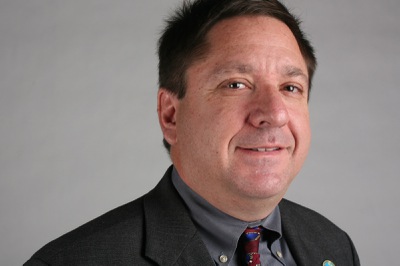
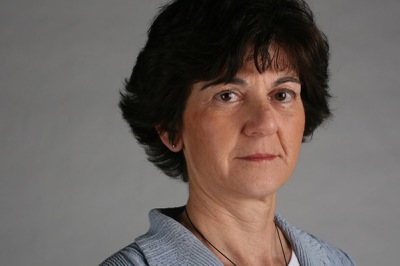
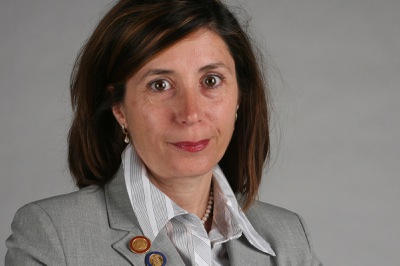
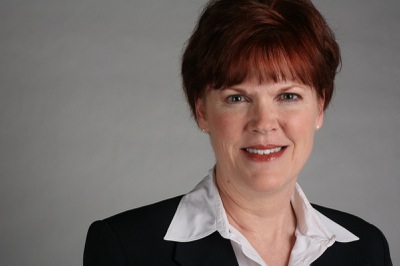

Join the Discussion:
Check this out for a full explanation of our conversion to the LiveFyre commenting system and instructions on how to sign up for an account.
Full comments policy